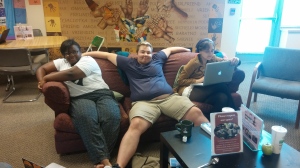This guest post on privilege and critical self-reflection comes from Women’s Center staff member Daniel Willey.
When I was asked if I would be interested in joining the Women’s Center staff, my first reaction was, “HELL YES.” The Women’s Center had very quickly become my favorite place on campus, and I was excited to jump on the opportunity to be a part of something that had been such a positive addition to my life. Last spring was a great time for me. I got more involved. I joined the Queer Leadership Council and the LGBT Campus Climate Workgroup. I was elected Outreach Coordinator for Freedom Alliance and Director of Public Affairs for GWST COMM. Recommendations, internship opportunities, and leadership roles were flying at me and it was great to feel like my skills were desirable.
But the more I thought about it, the more suspicious I became. How much of this have I actually earned? Aren’t there other people who are much more qualified than me for these jobs? How must my classmates feel about a freshman showing up and taking over? Am I taking over? How does privilege play into this? Do I even belong in these spaces? I have been thinking about these questions for months and I want to take this opportunity to reflect on what it means to be a male-identified staff member at a women’s center and the complicated combination of male identity and queer identity.
I think a lot of trans guys and people of trans male identities forget that even though some of us may have once identified as women or are sometimes read as women, we still have male privilege. Despite our queerness and the bureaucratic level problems we face with documentation or health care, there is still a place for us on the glass escalator. Now, this is not true for all of us– trans men of color, gender nonconforming trans men, or those who do not easily or readily “pass” (when one fits the standards of what a man or woman looks like well enough to not have their gender questioned) have a much more difficult time with this. For the sake of this post, when I say “trans men” I specifically mean trans men like me: white, medically transitioning, “passing” men.
My biggest struggle has been figuring out a way to see how my privilege has given me advantages in my life while also remembering that I actually did earn some of it. It’s a balance between knowing when to be proud of myself because I’ve earned something and knowing when I’ve been given something. I’m still trying to figure out how to contribute and participate in feminist and women’s movements without riding the glass escalator to the forefront. I’m learning to listen more than I speak and to support the efforts of others to liberate themselves rather than leading their liberation.
As for the Women’s Center, I think I will always be questioning and changing how I fit into my role here, just as women’s centers have changed since their first appearances in the 1970s. Women’s centers are still women-focused spaces but have branched out to include women of color and LGBTQIA women and people. Many women’s centers (including ours) have even started looking at toxic forms of hegemonic masculinity and how it affects women and men alike.
I belong here for now. My roles and responsibilities will change as the needs of my communities and the communities I support change, and I am still learning. I welcome feedback and criticism from community members– after all, you are why I’m here.
